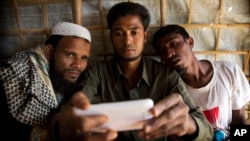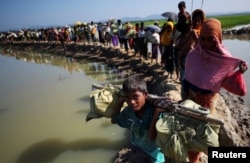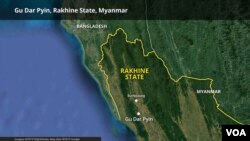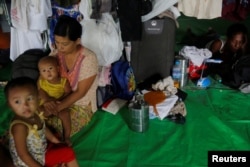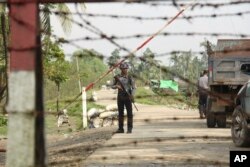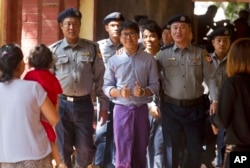The Myanmar government's rebuttal of an Associated Press report documenting mass graves in a village in northern Rakhine State has again highlighted the need for an independent investigation committee to be allowed access to the restive region, human rights groups say.
On February 2, AP published a report alleging a massacre had taken place at the hands of Myanmar security forces in the village of Gu Dar Pyin, close to Buthidaung town, in Rakhine State. The report, which relied on eyewitness testimony, satellite imagery and mobile phone footage, alleged security forces had burned some of the corpses with acid.
Seventy-five victims have been uncovered from the graves, the report said, but village residents estimate about 400 people were killed in the operation, which took place August 27, just days after the attacks by fighters from the Arakan Rohingya Salvation Army that were the catalyst for a military crackdown that has seen almost 700,000 people, overwhelmingly Muslim Rohingya, flee over the border into Bangladesh.
Government rebuttal
The day after the AP report, Myanmar state media published an article, saying it refuted the original reporting and that local officials had visited Gu Dar Pyin to investigate the claims. The February 3 article, published in the Global New Light of Myanmar, said villagers had "reiterated they had not heard of any massacres near their village."
The government claimed security forces were attacked by a combined group of ARSA fighters and about 500 villagers, the security forces had acted in self defense. The report said 19 "bodies of terrorists" were found, as well as weapons, including machetes and spears.
The government has since said it plans to sue AP for its reporting, and called on the agency to apologize.
Government spokesperson Zaw Htay could not be reached for comment before deadline.
"The Associated Press stands by its reporting," Lauren Easton, director of media relations for AP told VOA by email.
Calls for independent verification
The incident, coupled with the government's response, has led to analysts and human rights groups to again call for Myanmar authorities to allow an independent team to investigate the situation in northern Rakhine State, which has largely been closed off to the media and humanitarian actors since August.
Last year, the U.N. Human Rights Council created a fact-finding mission tasked with investigating the human rights situation in Myanmar, with a particular focus on Rakhine State. But Myanmar has denied visas to members of the mission and has also blocked access to the country for U.N. Special Rapporteur Yanghee Lee, who submitted her end of mission statement February 1 after visiting Myanmar refugees in Bangladesh and Thailand.
"The civilian government has failed to usher in a new era of openness and transparency and is instead persisting with repressive practices of the past," Lee reported.
Researchers for Amnesty International and Human Rights Watch told VOA the government's response highlighted the need for an independent investigation to be conducted in northern Rakhine.
Dutch diplomat Laetitia van den Assum, who was a member of the Advisory Commission on Rakhine State, which submitted its final report to the Myanmar government in August, called the findings in the AP report "horrific" and "deeply troubling".
She pointed to the one-day turnaround for the government's response to the article.
"This is simply not credible for serious crimes that require in-depth investigations," van den Assum told VOA. "Moreover, in a highly charged environment, speaking with villagers has to be done with great care."
"Only an independent and impartial team with the necessary technical and forensic know-how can be relied upon to make a proper assessment," she said, adding the U.N. fact-finding mission will present its first report in March based on research conducted outside the country and that "no one should underestimate the importance of this report".
Independent analyst David Mathieson told VOA the move to take action against AP was yet another attack on press freedom after two Reuters journalists covering the Rakhine crisis were arrested in December for handling official documents.
"This is just another attempt at a cover up," Mathieson told VOA. "It's part of a broader pattern of almost an criminally inept attempt at media relations, and I think it's only going to get worse."




